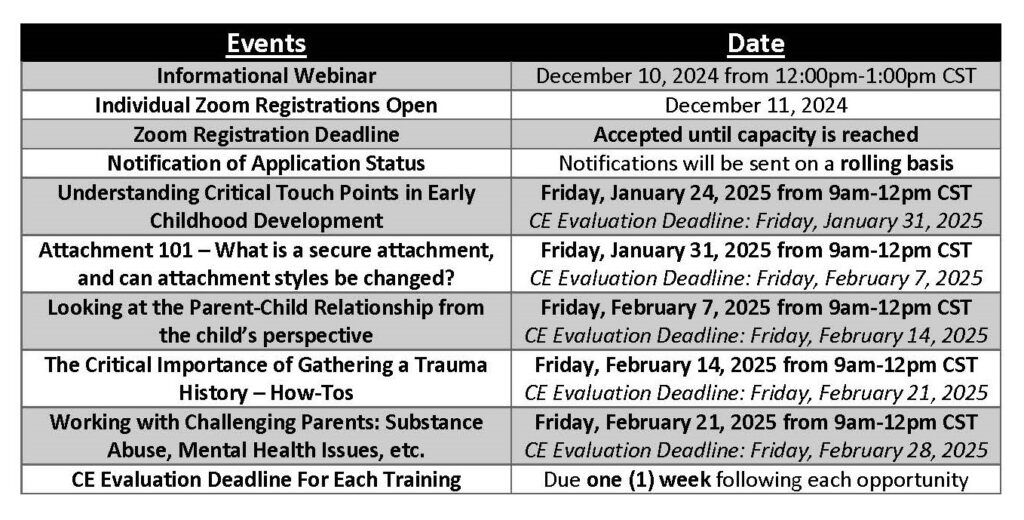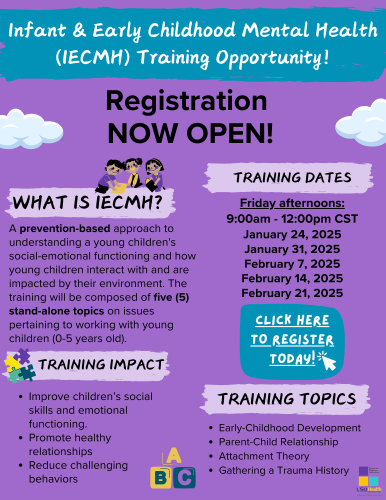Infant and Early Childhood Mental Health (IECMH) Training Series
The Center for Evidence to Practice (Center for E2P) is offering an opportunity for behavioral health practitioners in Louisiana to participate in Infant and Early Childhood Mental Health (IECMH) Training.
The IECMH Training is a prevention-based approach to understanding young children’s social-emotional functioning and how they interact with and are impacted by their environment. The training will be composed of five (5) stand-alone topics on issues pertaining to working with young children.
Due to the identified need for Medicaid behavioral health services specific to children and their caregivers, IECMH has been selected by the Office of Behavioral Health (OBH) as a research-informed training that will be expanded statewide.
Training Acceptance Criteria: Qualified behavioral health agencies/providers will be those who serve Medicaid-insured individuals and/or provide clinical therapy services to children and their caregivers in Louisiana free of charge; are licensed (or actively working towards licensure); and are actively (currently) treating children 0-5 years old and their caregivers. Preference will be given to those agencies that have multiple practitioners registering for this opportunity.
**If you are interested in participating in future Child-Parent Psychotherapy (CPP) Training, we highly recommend participating in this training series.**
Informational Webinar
The Center for Evidence to Practice held an Informational Webinar on the upcoming Infant and Early Childhood Mental Health (IECMH) Training Series. This webinar was led by the trainer, Dr. Amy Dickson, Ph.D.. Attendees had the opportunity to learn more about the modality and registration process. A question and answer (Q&A) session followed; a summary of the Q&A can be found here: Q&A Summary. It is strongly encouraged for those who are interested in applying for this training to view the recording of this webinar and review the summarized Q&A. You can view the two PowerPoint slides used for this webinar by clicking HERE and clicking HERE. Please email us at [email protected] if you have any questions.
IECMH Training Dates

Registration Information: Each training will be five (5) stand-alone topics. Registration for each date will be needed.
The Zoom registration for this training series opened on Wednesday, December 11, 2024, and will close once the training session reaches capacity. Each training opportunity will allow up to fifty (50) participants per session, please only register if you have the capacity to attend and can fully engage.
Friday, February 21, 2025, 9am-12pm CST
- Working with Challenging Parents: Substance Abuse, Mental Health Issues, etc.
- Will discuss how the child and their relationship with their caregiver is impacted by these challenges
- Will explore countertransference and how to support the parent and the relationship with the child
- Will discuss how to evaluate safety
Training Considerations
Please review the Training Guidelines and Expectations prior to attending training to ensure you are familiar and can adhere to them during training. Individuals who feel that they may not be able to adhere to these guidelines should consider not applying for this opportunity.
- Ensure a stable internet connection
- Use an updated web browser and install any required software
- Utilize a hands-free device such as a desktop, laptop, iPad (mobile devices not recommended)
- We will be using Zoom so ensure you check for updates prior to training
- Plan for backup internet and power options
- Share a contact number with staff and or group members for technical issues
- Create a quiet distraction free workspace
- Workspace lighting is better when it’s front facing and not back lit
- Choose comfortable, functional, and learner-friendly seating
- Please do not engage in training while operating a motor vehicle
- Please be in a confidential workspace like you would in a therapy session
- Download and review pre-training materials
- Consider printing the practice worksheets for practicum
- Have a notepad and pen ready for notes
- Save digital resources and materials for future reference
- Be punctual and return timely from assigned breaks
- Mute the microphone when not speaking
- Always keep your camera on as this is a CE requirement
- Ensure confidentiality and security
- Consider a headset with a microphone to enhance your audio experience
- Respect others’ background and appearance
- Be courteous during discussions
- Dress comfortably and appropriately
- Have snacks, hydrate, caffeinate if needed
- Rest well prior to training and prepare to rest after
- Consider not scheduling work or only light work after training daily


